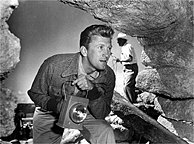Journalists, Blogs and Trust
I once considered making the title of this blog, "It Takes One to Know One." Apparently I am not the only journalist who has doubts about the ethical virtues of his colleagues.
A new survey shows that 45% of journalists are less trusting of the professional behavior of their own colleagues — up from 34% in 2003.
The same survey found that journalists are increasingly turning to blogs for story ideas and research. "Fully 33% of journalists say they use blogs as a way of uncovering breaking news or scandals," says the article in EMarketer linked above. The blog-hating, politically biased, well-compensated Jim Romenesko might want to keep that in mind.
Another finding, though rather obvious, might be of interest to the Payola Pundit, UN correspondent-consultant Ian Williams, subsidized author Linda Fasulo and the other UN hacks who moonlight at the East River Debating Society, go on expense-paid junkets, or take money from pro-UN foundations. Another finding is that "93% note that they are less trusting of colleagues who are paid to act as spokespeople."
I wonder how they'd feel about the UN correspondent scandal, which is even more wide-ranging than simply being paid as a spokesperson. Most journalists don't even know about it, as it has gone unreported by Romenesko and, of course, Columbia Journalism Review, which for the past year has been secretly run by Williams' employer at The Nation, Victor Navasky.
A new survey shows that 45% of journalists are less trusting of the professional behavior of their own colleagues — up from 34% in 2003.
The same survey found that journalists are increasingly turning to blogs for story ideas and research. "Fully 33% of journalists say they use blogs as a way of uncovering breaking news or scandals," says the article in EMarketer linked above. The blog-hating, politically biased, well-compensated Jim Romenesko might want to keep that in mind.
Another finding, though rather obvious, might be of interest to the Payola Pundit, UN correspondent-consultant Ian Williams, subsidized author Linda Fasulo and the other UN hacks who moonlight at the East River Debating Society, go on expense-paid junkets, or take money from pro-UN foundations. Another finding is that "93% note that they are less trusting of colleagues who are paid to act as spokespeople."
I wonder how they'd feel about the UN correspondent scandal, which is even more wide-ranging than simply being paid as a spokesperson. Most journalists don't even know about it, as it has gone unreported by Romenesko and, of course, Columbia Journalism Review, which for the past year has been secretly run by Williams' employer at The Nation, Victor Navasky.


<< Home